Text
White House Calls for 'Reciprocity' Amid India’s 100% Tariffs on US Goods
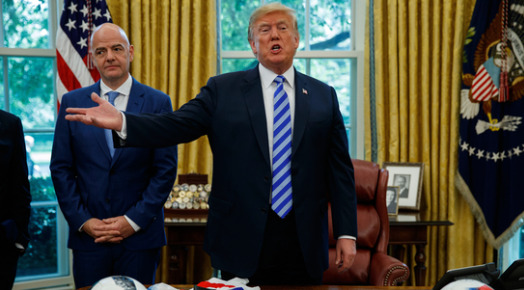
The White House on Monday called for reciprocal tariffs, listing India among countries it accuses of imposing “unfair” and damaging tariffs on U.S. exports. With reciprocal tariffs set to take effect on April 2, the U.S. is pushing back against nations, including India, that tax American goods heavily.
White House Press Secretary Karoline Leavitt highlighted India’s 100% tariff on American agricultural products, describing it as a barrier that makes it “virtually impossible” for U.S. products to reach key foreign markets. Leavitt stressed that these tariffs have harmed U.S. businesses and that it’s time for "reciprocity" in trade practices.
“These countries have been ripping off our nation for far too long,” Leavitt said, emphasizing the disdain some nations have shown toward American workers. She pointed to high tariffs elsewhere, such as the European Union's 50% tax on American dairy, Japan’s 700% tariff on U.S. rice, and Canada’s nearly 300% levy on American butter and cheese. India’s 100% tariff on American agricultural goods only adds to this pressure.
Leavitt’s remarks come as President Donald Trump prepares to announce a significant shift in U.S. trade policy. Earlier, Trump had referred to current tariffs as “temporary” and “small,” but emphasized that the upcoming reciprocal tariffs would be a "game-changer."
Leavitt did not provide specific details but assured that Trump’s trade team had finalized plans, which will focus on ensuring fairness for U.S. businesses. The new tariffs are expected to be officially announced on Wednesday, signaling a major change in U.S. trade relations.
0 notes
Text
South Korea Battles Deadly Wildfires as Thousands Evacuated

South Korea is struggling to contain devastating wildfires that have swept across multiple regions, forcing thousands to evacuate. The blazes, fueled by dry, windy conditions, have already claimed four lives and scorched nearly 14,700 hectares (36,310 acres), making this one of the worst fire outbreaks in the country’s history.
Key Developments:
More than a dozen wildfires erupted over the weekend, spreading rapidly.
Over 3,000 residents have been evacuated to shelters.
At least 11 people have been seriously injured.
Fire containment efforts are hampered by strong winds and dry weather.
More than 6,700 firefighters have been deployed.
The government has declared a state of emergency in four regions.
The Korea Forest Service reported that containment of the fire in Uiseong has dropped from 60% to 55% as efforts continue. Authorities have mobilized all available resources to control the flames, including emergency personnel and equipment.
Cause and Impact: Officials say the Uiseong fire was likely caused by an individual visiting a family grave who accidentally ignited the blaze. Prime Minister Han Duck-soo urged the public to follow wildfire prevention measures, emphasizing that most such disasters result from human negligence.
Meanwhile, Japan is also battling wildfires. In western Ehime and Okayama, hundreds of firefighters are working to control blazes that have already burned over 3,000 hectares and damaged multiple buildings.
With dry conditions persisting, both South Korea and Japan face an ongoing wildfire crisis, raising concerns about climate change and fire prevention strategies.
0 notes
Text
Israeli Strikes Across Gaza Kill 21, Escalating Conflict in Rafah

Israeli air and ground strikes across the Gaza Strip have killed at least 21 Palestinians, according to local health authorities. The strikes, part of an intensified offensive near Rafah on the Egyptian border, mark a significant escalation in the conflict.
Since Israel resumed military operations last Tuesday, health officials report that nearly 700 Palestinians have been killed, including at least 400 women and children. The Islamist group Hamas has confirmed the deaths of several senior political and security officials.
Israel states that its renewed military actions aim to pressure Hamas into releasing the remaining hostages held in Gaza. Israeli authorities insist they take measures to minimize civilian casualties, while also questioning the casualty figures reported by Gaza’s health ministry, which operates under Hamas control.
Israeli Defense Minister Yoav Gallant reaffirmed that the Israeli military is targeting Hamas, not Palestinian civilians. However, he blamed Hamas for endangering civilians by operating from populated areas. "When Hamas fights in civilian dress, from civilian homes, and from behind civilians, it puts civilians in danger and they pay a horrible price," Gallant stated, urging residents to evacuate conflict zones. Hamas denies these allegations.
In Rafah, local authorities report that thousands of civilians are trapped in the Tel Al-Sultan area, where Israeli forces have been operating. The municipality stated that communication with the neighborhood has been completely severed, leaving families without food, water, or medical supplies amid a healthcare system on the verge of collapse. The Palestinian Civil Emergency Service estimates that 50,000 residents remain stranded in the city.
The Israeli military confirmed that its forces had encircled Tel Al-Sultan, describing the operation as an effort to dismantle "terror infrastructure sites and eliminate terrorists in the area."
The ongoing conflict, which has lasted nearly 18 months, has resulted in over 50,000 Palestinian deaths, according to Palestinian officials. The war began after Hamas launched an attack on southern Israel on October 7, 2023, killing approximately 1,200 people and taking over 250 hostages, according to Israeli figures.
0 notes
Text
U.S. Plane Crashes in 2025 vs. 2024: A Detailed Comparison

Aviation accidents have made headlines in early 2025, raising concerns about flight safety across the United States. With major crashes and mid-air collisions occurring within just a few weeks, many are wondering—have there been more plane crashes this year compared to 2024?
Why It Matters
The recent increase in high-profile aviation incidents has sparked public concern, especially after the deadliest U.S. plane crash in nearly 25 years. Adding to the controversy, the Trump administration has come under scrutiny for its recent decision to cut hundreds of probationary FAA employees.
How Many Plane Crashes Have Occurred in 2025?
According to the National Transportation Safety Board (NTSB), there have been 87 aviation accidents in the U.S. so far in 2025. This number does not include the recent mid-air collision in Arizona.
January 2025: 62 aviation incidents
February 2025 (as of Feb. 19): 25 aviation incidents
The 14th fatal plane crash of the year occurred on February 19 in Arizona, where two small planes collided near Marana Regional Airport, resulting in at least one confirmed death.
How Many People Have Died in Plane Crashes in 2025?
Despite fewer total accidents than in 2024, fatalities have more than doubled this year. At least 85 people have died in aviation crashes so far in 2025.
Deadliest Plane Crashes in 2025
January 29 (Washington, D.C.) – An American Airlines regional jet collided mid-air with a Sikorsky UH-60 Black Hawk helicopter, killing 67 people.
February 6 (Alaska) – A Bering Air Cessna Caravan crashed near Nome, Alaska, killing 10 people.
January 31 (Philadelphia) – A medical jet crashed into a residential area, killing 7 people.
February 10 (Arizona) – Two private jets collided at Scottsdale Airport, killing 1 person and injuring 4 others.
February 19 (Arizona) – A mid-air collision between two small planes near Marana Regional Airport, killing at least 1 person.
How Does 2025 Compare to 2024?
Between January 1 and February 19, 2024, the NTSB recorded 123 aviation accidents, including 18 fatal crashes that resulted in 42 deaths.
In contrast, 2025 has seen fewer total incidents but significantly more fatalities. The most severe crash in 2024 involved an Airbus helicopter on February 9, which killed six people. No commercial airline crashes occurred in early 2024.
In total, 1,415 aviation accidents were reported in 2024, including 257 fatal crashes, resulting in 306 deaths. The deadliest was a Pilatus aircraft crash in Recluse, Wyoming, killing six people.
Why Does It Seem Like There Are More Plane Crashes in 2025?
Larger aircraft are involved. Unlike in 2024, 2025 has seen commercial jets in fatal crashes, leading to higher death tolls.
Social media amplifies incidents. Videos and images of aviation accidents are spreading rapidly, making crashes feel more frequent.
Is Airplane Travel Still Safe?
Experts continue to emphasize that air travel is the safest mode of transportation.
NTSB Chairperson Jennifer Homendy reassured the public, stating: "You are at greater risk getting into your car to and from the airport. Road travel accounts for over 43,000 deaths annually, while aviation remains incredibly safe."
However, public confidence in flying is declining. A recent AP-NORC poll found that:
64% of U.S. adults consider air travel "very safe" or "somewhat safe," down from 71% in 2024.
20% of respondents now believe flying is unsafe, up from 12% last year.
What Happened to the Delta Plane Crash in Toronto?
On February 12, 2025, a Delta Air Lines CRJ-900 jet flipped over during landing at Toronto Pearson Airport amid extreme winds. All 80 passengers survived, but several were injured.
Notably, the CRJ-900 belongs to the same aircraft family as the CRJ-700, which was involved in the Washington, D.C. crash on January 29.
What Happens Next?
The FAA and NTSB continue to investigate the major plane crashes of 2025, with more details expected in the coming weeks.
Additionally, the new administration is reassessing federal aviation policies. While cost-cutting efforts have targeted government agencies, air traffic controllers have been excluded from federal layoffs, highlighting concerns about flight safety.
Final Thoughts
While plane crashes in 2025 have resulted in more fatalities than in 2024, aviation remains one of the safest ways to travel. Stay updated on FAA safety reports and ensure flight confidence through real-time aviation monitoring.
0 notes
Text
Musk and Ramaswamy Set to Meet with House Republicans for DOGE Reform Talks
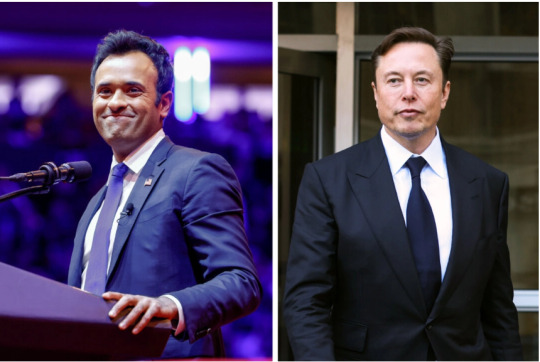
WASHINGTON—House Speaker Mike Johnson announced on Nov. 27 that he would host Tesla and SpaceX CEO Elon Musk and biotechnology businessman Vivek Ramaswamy at the U.S. Capitol to discuss the activities of their new Department of Government Efficiency (DOGE), with Republican members of Congress.
The DOGE is an advisory body chartered by President-elect Donald Trump to advise his incoming administration on cost-cutting, deregulation, and reducing the size of the U.S. government.
Johnson announced that Musk and Ramaswamy would be invited on Dec. 5 to discuss their proposals, which have so far been posted on Musk’s social media platform X, with Republican senators and members of the House of Representatives.Looking forward to hosting @elonmusk and @VivekGRamaswamy next week on Capitol Hill to discuss major reform ideas to achieve regulatory rescissions, administrative reductions, and cost savings—& revive the principle of limited government!” wrote Johnson on X. Despite its title, the DOGE will not be a federal executive department—which would require congressional approval—or receive taxpayer funds.
Trump, in his announcement on Truth Social, wrote that the organization will “provide advice and guidance from outside Government, and will partner with the White House and Office of Management & Budget to drive large scale structural reform, and create an entrepreneurial approach to Government never seen before.”“We expect mass reductions. We expect certain agencies to be deleted outright,” Ramaswamy recently told Fox News. “We expect massive cuts of federal contractors and others who are overbilling the federal government,” he said, which he said could be accomplished quickly due to the “legal backdrop [of] the Supreme Court.”
Any executive branch downsizing is likely to affect members of Congress significantly, many of whom use earmarks and leverage votes to bring federal jobs and spending projects to their constituencies, which they publicize during election campaigns. Johnson’s meeting with DOGE leaders will be the first major interaction regarding government reduction, which could become a significant issue in 2026’s midterm elections.
The Republican Conferences in the House and Senate have already acted in anticipation of DOGE activities. The Senate DOGE Caucus has been established, with Sen. Joni Ernst (R-Iowa) as its chair, while the House will create an Oversight Subcommittee on DOGE to be chaired by Rep. Marjorie Taylor Greene (R-Ga.).
0 notes
Text
Senate Confirms Michael Whitaker as FAA Administrator After 19-Month Vacancy
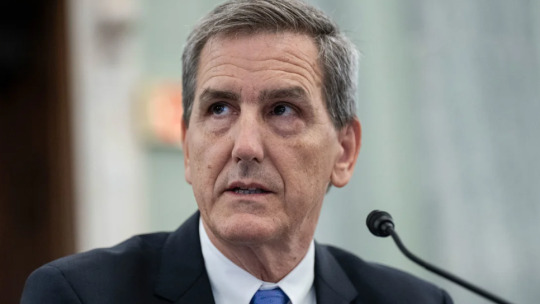
On Tuesday, the U.S. Senate confirmed Michael Whitaker to a five-year term as the Administrator of the Federal Aviation Administration (FAA). Whitaker, a former deputy FAA administrator during the Obama administration, brings extensive experience in aviation leadership to the role. He most recently worked as an executive at a company developing electric air taxis, and has held senior positions at major airlines, including United Airlines.
At his confirmation hearing, Whitaker emphasized that his past experience at the FAA would give him a distinct advantage in leading the agency through its current challenges. He acknowledged the growing complexities in the aviation industry, including increasing air traffic, safety concerns, and technological advances such as drones and flying taxis. Whitaker expressed a commitment to modernizing the aviation system, ensuring it adapts to the future while maintaining safety and efficiency.
One of Whitaker’s top priorities will be providing steady leadership at the FAA, which has faced intense scrutiny following several high-profile airliner close calls, understaffed air traffic control, and the tragic Boeing 737 MAX crashes. The FAA, responsible for overseeing aviation safety, air traffic control, and aircraft certification, has been operating without a permanent leader since March 2022. Whitaker’s confirmation marks a critical step toward stabilizing the agency.
His nomination was welcomed by a variety of aviation industry groups, including those representing airlines, pilots, and passengers. Whitaker's leadership comes after the withdrawal of the Biden administration's first nominee for the position, Phil Washington, due to concerns about his experience and ties to a political corruption investigation.
With his appointment, Whitaker will lead the FAA into a new era of technological innovation and safety improvements, working to ensure the agency is equipped to handle the rapidly evolving demands of modern aviation.
0 notes
Text
Who is Rep. Mike Johnson, the new House speaker?
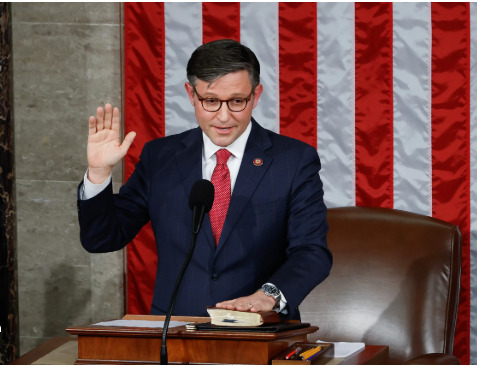
ep. Mike Johnson, the new speaker of the House, has been a vocal supporter of former President Donald Trump and was a key congressional figure in the failed efforts to overturn the 2020 election.
The Louisiana Republican was first elected to the House in 2016 and serves as vice chairman of the House Republican Conference, as well as GOP deputy whip, an assistant leadership role. An attorney with a focus on constitutional law, Johnson joined a group of House Republicans in voting to sustain the objection to electoral votes on January 6, 2021. During Trump’s first impeachment trial in January 2020, Johnson, along with a group of other GOP lawmakers, served a largely ceremonial role in Trump’s Senate impeachment team.
Johnson also sent an email from a personal email account in 2020 to every House Republican soliciting signatures for an amicus brief in the longshot Texas lawsuit seeking to invalidate electoral college votes from multiple states.
After the election was called in favor of Joe Biden on November 7, 2020, Johnson posted on X, then known as Twitter, “I have just called President Trump to say this: ‘Stay strong and keep fighting, sir! The nation is depending upon your resolve. We must exhaust every available legal remedy to restore Americans’ trust in the fairness of our election system.’”
0 notes
Text
Special Counsel Probe into Biden's Handling of Classified Documents Nears Conclusion

The special counsel investigating President Joe Biden's handling of classified documents is reportedly nearing the end of its inquiry, with legal experts anticipating a conclusion in the coming weeks. The investigation, which was launched in early 2023, has focused on Biden’s possession of classified materials that were found at his private office and residence, sparking concerns about potential mishandling of sensitive government documents.
The probe has explored whether Biden's actions violated federal law, particularly the handling of classified information outside of secure government channels. This follows similar investigations into former President Donald Trump’s handling of classified documents, creating a parallel legal landscape that has drawn significant public and political attention.
Sources close to the investigation suggest that the special counsel has gathered substantial evidence, and the final stages may involve reviewing whether any criminal charges are warranted. However, insiders emphasize that the investigation's conclusion may hinge on complex legal questions surrounding intent, security procedures, and Biden’s cooperation with federal authorities.
Biden’s legal team has publicly stated that they have fully cooperated with the investigation and that the discovery of the documents was inadvertent. The president has also emphasized that his handling of the materials was in accordance with the law and that they were securely stored once discovered.
While no formal charges have been filed against Biden, the investigation has raised questions about the broader issue of classified document security and the responsibilities of government officials. The outcome of this probe could have lasting implications for Biden’s political future, particularly as he prepares for re-election in 2024.
As the investigation nears its end, political analysts are closely watching how the Justice Department handles the case, particularly in light of similar ongoing legal proceedings involving Trump. The results could influence not only the public perception of Biden but also the broader national conversation on accountability and transparency in handling classified information.
0 notes
Text
Pew Poll: Democrats' Pessimism About Party's Future Reaches Peak in the Trump Era

Pew Poll: Democrats' Pessimism About Party's Future Reaches Peak in the Trump Era
A recent Pew Research Center poll has revealed a troubling trend among Democratic voters, showing that pessimism about the future of their party has reached its highest level since the Trump era. The poll, conducted in late 2024, highlights deep concerns within the Democratic base about the direction of the party, its leadership, and its ability to win future elections.
According to the survey, nearly 60% of Democrats expressed uncertainty or dissatisfaction with the party's prospects in the coming years, marking a significant increase from previous years. This growing sense of pessimism comes after a series of electoral setbacks, internal divisions, and challenges posed by the rising influence of populist movements, both on the left and right.
Key factors contributing to the disillusionment include frustration with the pace of policy reforms, disappointment over unfulfilled campaign promises, and concerns about leadership within the party. Many Democratic voters have also voiced skepticism about the party’s ability to connect with working-class Americans, especially in swing states that were pivotal in recent elections.
While some Democrats still maintain hope for the party’s future, others are increasingly questioning whether the current direction is sustainable in the face of challenges from both the Republican Party and progressive factions within their own ranks. Many are calling for a renewed focus on core issues such as healthcare, economic inequality, and climate change, hoping to revitalize the party's appeal and unite its diverse base.
The results of the Pew poll signal a growing divide between the party’s more centrist leadership and its left-wing activists, who have become increasingly vocal about the need for bold, transformative change. These internal tensions could shape the Democratic agenda moving forward, with party leaders likely facing mounting pressure to address voter concerns and reassert the party’s relevance in a rapidly changing political landscape.
As the 2024 election cycle progresses, it remains to be seen how these feelings of pessimism will impact voter turnout, party unity, and ultimately, the Democratic Party’s ability to regain its momentum on the national stage.
0 notes
Text
Three Key House Races Will Decide the Size of GOP's Narrow Majority
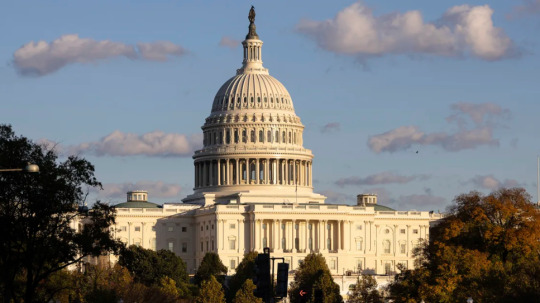
As the 2024 election season intensifies, the future of the GOP's slim majority in the U.S. House of Representatives hangs in the balance, with three undecided races poised to determine whether Republicans retain their fragile control or face a reduced majority.
Currently, the Republican Party holds a narrow advantage in the House, making these races critical for shaping the legislative landscape over the next two years. The outcomes could directly influence the GOP’s ability to pass key legislation, control committee assignments, and set the national political agenda.
The three races, still too close to call due to tight margins and ongoing recounts or legal challenges, have captured national attention. These districts are located in battleground states, where voters have been deeply divided along party lines. Even small shifts in voter turnout or demographic changes could tip the scale, making these contests among the most consequential of the election cycle.
In each of these districts, both parties have poured significant resources into campaigning, recognizing the importance of these races not just for the candidates, but for the future power dynamics in Congress. Republican leadership is hoping to retain these seats to maintain their ability to advance conservative policies, while Democrats are aggressively targeting them in the hopes of further weakening the GOP’s majority.
Experts warn that the outcome of these races could have lasting consequences. If the GOP loses even one of these districts, their majority could shrink further, making it harder to pass legislation without significant compromise. Conversely, a clean sweep could allow Republicans to push forward with their agenda more effectively, bolstering their influence in the legislative process.
The final results of these three races are expected to come down to the wire, with both sides eager to secure every last vote. As the ballots are counted and legal challenges are resolved, the nation watches closely, knowing that the results will set the stage for the next phase of governance.
Stay tuned for updates as the final results come in, and the fate of the GOP’s majority is decided.
0 notes
Text
How Redistricting Battles Could Shape the Balance of Power in the US House

As redistricting battles across the United States come to a close, the final congressional district maps could have a significant impact on the upcoming elections, potentially shifting the balance of power in the U.S. House of Representatives.
The redistricting process, which takes place every ten years following the census, has been a fiercely contested issue in many states. Political parties have used this opportunity to redraw district lines to favor their candidates, a practice known as gerrymandering. Although the process is intended to reflect population changes, it often results in districts that are manipulated to benefit one party over another.
In 2024, the outcomes of these redistricting decisions could be pivotal. In some states, new district boundaries could help Republicans or Democrats secure a majority in the House, depending on how the maps are drawn. Experts argue that this could influence the entire legislative agenda, shaping everything from policy priorities to the passage of laws.
Key battleground states like Pennsylvania, Texas, and Florida have seen intense battles over district lines, with each side accusing the other of attempting to undermine fair representation. The outcome in these states, along with others, will likely determine which party holds the majority in the House after the 2024 elections.
Critics of gerrymandering argue that it undermines democracy by allowing politicians to choose their voters instead of the other way around. In response, some states have turned to independent commissions or courts to ensure that the maps are drawn more fairly, though challenges to these efforts continue.
With the 2024 election cycle approaching, the consequences of these redistricting decisions are more significant than ever. The new boundaries will not only determine which candidates have the advantage but also influence the policies that shape the nation for the next decade.
As the legal challenges and political maneuvering continue, all eyes will be on the states where redistricting could make or break the future of American politics. Stay tuned for updates on this critical issue.
0 notes
Text
Elon Musk Sparks Fear Among Federal Workers with Call for Job Cuts

Elon Musk Sparks Fear Among Federal Workers with Call for Job Cuts
In a controversial move, Elon Musk has publicized the names of federal employees he believes should be cut, igniting widespread alarm among government workers and drawing criticism from various quarters. The tech billionaire, known for his outspoken views and unconventional approach, shared the list in a public forum, framing it as a step toward streamlining bureaucracy and increasing efficiency.
Critics argue that naming individuals in such a public manner could endanger their safety, compromise their careers, and foster a hostile environment. Many federal employees expressed fear and frustration, questioning the motives and potential repercussions of Musk’s actions.
"Elon Musk's statements are not only reckless but also a threat to public servants who work tirelessly for this country," said a representative of a federal workers’ union. "No one should have to fear for their job—or their safety—because of someone’s political or personal agenda."
Supporters of Musk argue that his actions shed light on inefficiencies within the government and spark a much-needed conversation about accountability and resource management. Some have praised his boldness, viewing it as a necessary disruption in a system they see as outdated.
However, legal experts have raised concerns over the ethical and legal implications of naming specific individuals. They point out that such actions could lead to harassment, violations of privacy, or even lawsuits.
As debates around Musk’s approach intensify, the incident underscores growing tensions between private sector influencers and public institutions. For now, federal agencies and advocacy groups are rallying to protect employees’ rights and ensure workplace safety amidst the backlash.
This developing story highlights the intersection of power, influence, and responsibility in the modern era. Stay tuned for further updates.
0 notes
Text
Trump Team Alleges Cabinet Picks Facing Bomb Threats and Swatting Incidents

Trump Team Alleges Cabinet Picks Facing Bomb Threats and Swatting Incidents
The Trump transition team has claimed that several of their Cabinet nominees have been targeted by bomb threats and swatting incidents, raising concerns about the safety of those under consideration for key government roles.
Swatting, a dangerous practice where false emergency calls are made to dispatch heavily armed law enforcement to a specific location, has reportedly been used against multiple individuals associated with the incoming administration. Additionally, bomb threats have been made, further escalating fears and security precautions.
“These attacks are not just a threat to the individuals involved but also to the democratic process itself,” a spokesperson for the Trump team stated. They emphasized the need for a calm and respectful transition of power, condemning the incidents as politically motivated and designed to intimidate.
Authorities are investigating the incidents, with law enforcement agencies reportedly increasing protective measures for those at risk. Meanwhile, some of the targeted individuals have expressed resolve, insisting they will not be deterred from serving the country.
The transition team has called on leaders from all political spectrums to denounce such acts, urging unity in a time of political division. As the investigation unfolds, the incidents spotlight the rising tensions surrounding the political climate in the United States.
1 note
·
View note
Text
How Will Trump's Election Victory Impact His Ongoing Criminal Cases?
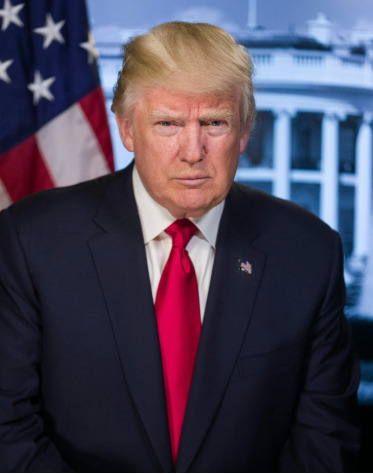
There are still concerns about whether Donald J. Trump would be shielded from the numerous pending criminal cases if he were to win the 2024 U.S. presidential election.Trump is currently facing a number of criminal charges, including as accusations of election meddling, financial fraud charges, and an investigation into the handling of confidential data. His return to the presidency adds new layers of complexity to each of these situations.
Federal vs. State Cases
rump faces both federal and state charges, with federal cases potentially influenced by his control over the Department of Justice. However, state cases in Georgia and New York remain largely immune to federal interference, posing a significant legal challenge. For details, see The New York Times or Reuters.
Legal Strategy Shifts in Light of Trump's Presidency
Trump’s victory provides him with increased resources, influence, and the ability to shape public narratives around his cases. His legal team may leverage his presidency to argue for delays or dismissals, citing executive duties as a conflict with court appearances. Additionally, his re-election could influence jury pools and public sentiment, potentially benefiting his defense.
1 note
·
View note